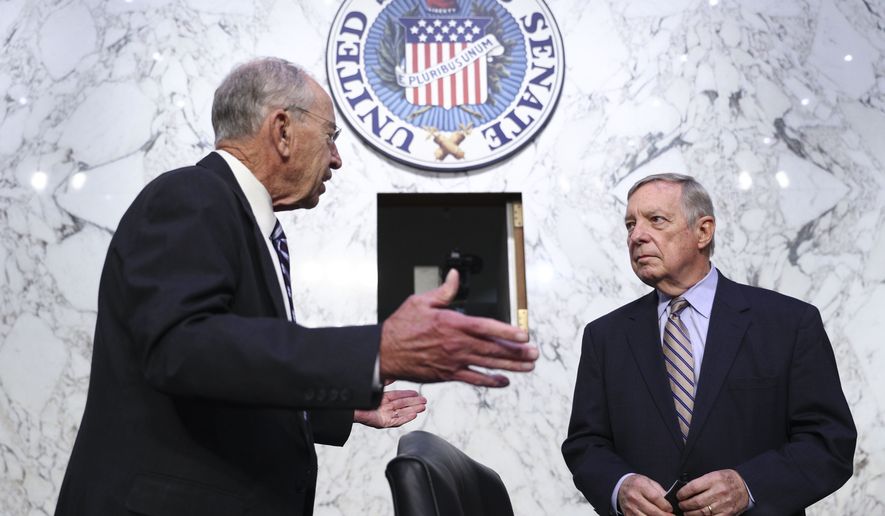Republicans accused Democrats of playing politics with the Supreme Court during a hearing on Wednesday over Texas’ contested abortion law, which bans abortions after a fetal heartbeat is detected.
Iowa Sen. Charles E. Grassley, the top Republican on the Senate Judiciary Committee, said Democrats chose to hold the hearing just days before the Supreme Court is set to begin its upcoming term — a term that includes what could be a pivotal case on abortion law.
The justices are set to hear arguments on Mississippi’s 15-week ban on abortion that challenges the court’s 1973 precedent in Roe v. Wade, which granted women the right to an abortion pre-viability.
Mr. Grassley blamed left-wing dark money groups and liberal senators who have threatened the justices with reforming the high court if they do not rule favorably for the left.
“This campaign against the Court — and against individual justices — has hurt the public. The dishonest rhetoric doesn’t help the American people understand the issues,” Mr. Grassley said.
He pointed to Democratic senators’ claims last year that Justice Amy Coney Barrett, if confirmed, would rip away health care from millions of Americans by striking down the Affordable Care Act. But once she was on the court, Justice Barrett joined the majority of the court in upholding the law.
Similarly, Republicans said Senate Majority Leader Chuck Schumer, New York Democrat, directly threatened justices by name last year when he rallied pro-choice activists outside the high court ahead of a Louisiana abortion case that weighed the hospital admitting privileges of abortion providers.
“I want to tell you, Gorsuch; I want to tell you, Kavanaugh: You have released the whirlwind and you will pay the price,” Mr. Schumer said, calling out two of President Trump’s high court appointees, Justice Neil Gorsuch and Justice Brett Kavanaugh.
Recent polls have, in fact, shown public trust in the court has fallen to a new low.
A Gallup poll published last week found the Supreme Court’s approval rating dropped 9 percentage points since July, after the high court declined to block a Texas ban on abortion after a fetal heartbeat is detected. The poll found 40% of Americans approved of the job the high court is doing, while 53% disapproved.
Senate Judiciary Committee Chairman Sen. Dick Durbin, Illinois Democrat, said the hearing was necessary because the high court has issued controversial moves in a number of cases through its “shadow docket.” The “shadow docket” refers to orders the court issues on emergency motions ahead of hearing oral arguments in a case.
The Texas law was weighed by the justices on an emergency basis earlier this month, without oral arguments.
Mr. Durbin said the 6-3 conservative majority on the Supreme Court has more frequently used the “shadow docket,” noting that from 2001 to 2017, the high court issued eight “shadow docket” decisions but out of 36 requests from the Trump Justice Department, the high court granted 28 of those orders.
Mr. Durbin denied holding the committee hearing for political reasons, saying there was nothing “conspiratorial” about the scheduling ahead of the Supreme Court’s new term.
“It is our responsibility and there was nothing sinister in selecting this date for the hearing,” Mr. Durbin said.
Sen. John Cornyn, Texas Republican, took issue with the federal government injecting itself in state legislation.
“This is part of a concerted effort … on the part of our Democratic colleagues to attack judicial independence,” he said. “This is part of a concerted effort to intimidate and bully members of the Supreme Court.”
Witnesses called before the panel debated the constitutionality of the Texas law.
Donna Howard, a Texas state lawmaker representing District 48, said that an embryo does not have a heartbeat at six weeks of pregnancy, but instead the “whoosh, whoosh” sound on a sonogram is simply cardiac activity.
“The clock runs out for most, forcing them to carry a pregnancy they do not want,” she said of women denied abortions in the state.
But Edmund LaCour Jr., Alabama’s solicitor general, said the term “shadow docket” is unfair, noting the Supreme Court’s cases are available publicly online. He said the reality is litigation requires courts to weigh in on emergency matters ahead of rulings on the merits.
“These proceedings hardly warrant such a nefarious name,” he said.
The Supreme Court refused to block the Texas heartbeat law earlier this month that went into effect Sept 1, which allows individuals — not the state — to sue abortion providers who perform abortions after a heartbeat is detected, usually around six to eight weeks of pregnancy.
The abortion providers challenging the law have returned to the high court for a second time, asking the justices to weigh the case before the 5th U.S. Circuit Court of Appeals rules on the constitutionality of the law.
A more timely threat to Roe v. Wade, though, will be heard Dec.1 when the court considers the Mississippi case. Mississippi’s 15-week ban was blocked by lower courts, but the Supreme Court agreed to review the case. A decision is expected in June.
Democrats, outraged by red states passing increasingly strict abortion laws, passed a law in the House last week that would undo state restrictions. No Republicans supported the legislation.
The bill would codify Roe v. Wade. But the Women’s Health Protect Act is unlikely to be taken up in the Senate.
Mr. Grassley challenged Senate Democrats to hold a hearing on the House legislation, saying it is extreme and the public should learn more about it.
“The American people would see how radical that bill is,” he said.
• Alex Swoyer can be reached at aswoyer@washingtontimes.com.




Please read our comment policy before commenting.